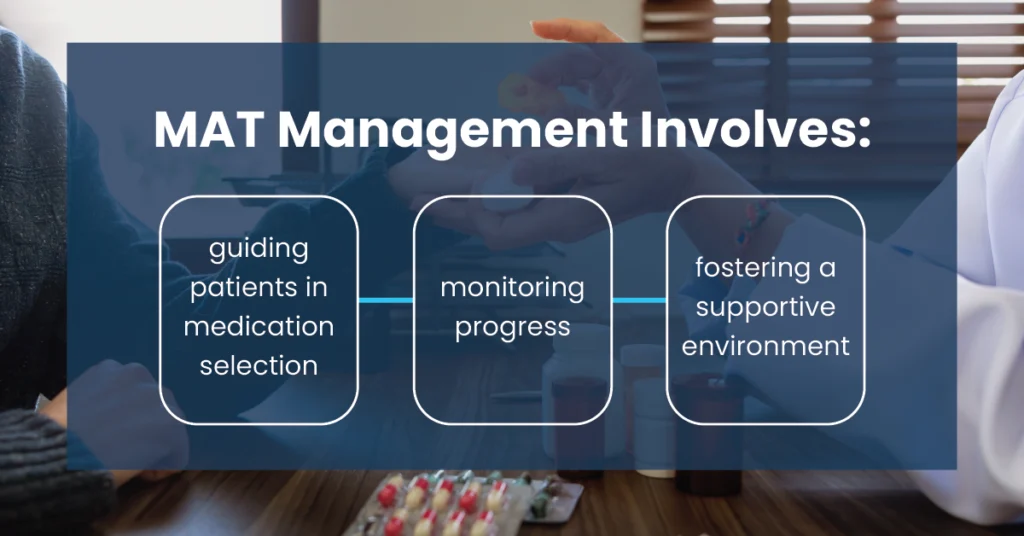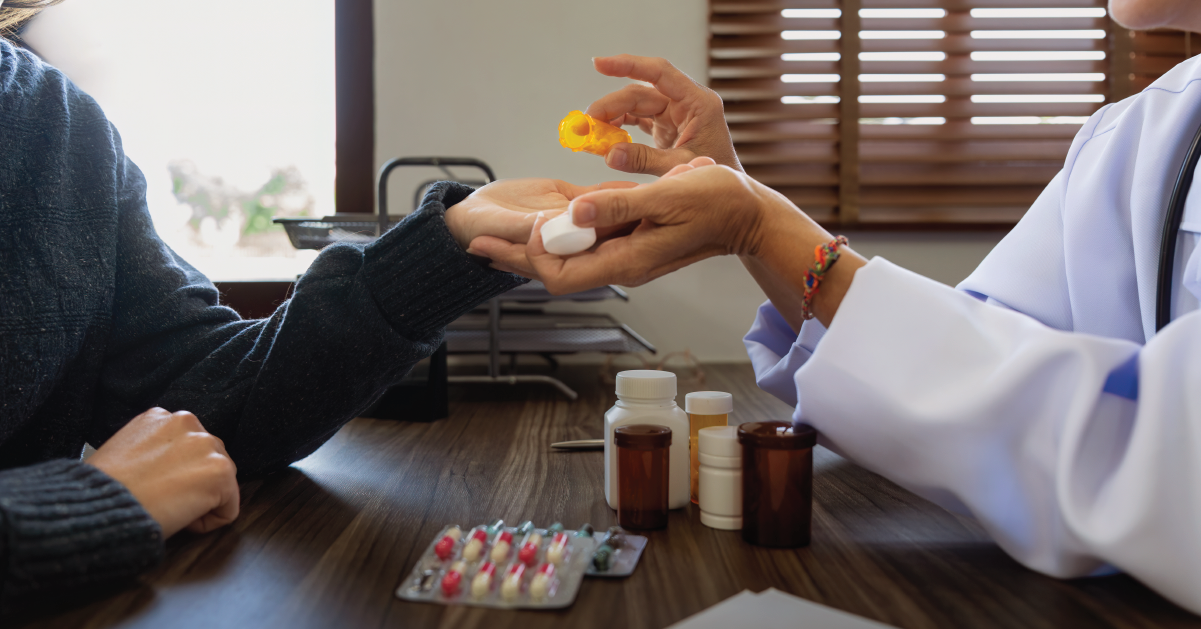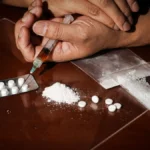MAT, or medication-assisted treatment, is a holistic approach to overcoming substance use disorder, especially during opioid addiction treatment. MAT helps people reduce or quit substance misuse by easing withdrawal symptoms and cravings.
It’s an effective way to support recovery by combining medications with counseling and behavioral therapies. For opioid addiction, MAT medications like methadone play a crucial role in managing addiction, promoting stability, and improving overall well-being.
Key Takeaways
MAT, or medication-assisted treatment, effectively combats opioid addiction, providing relief from withdrawal symptoms and cravings. Here’s what you need to know:
- Buprenorphine and naltrexone offer nuanced approaches, reducing cravings and preventing relapse effectively.
- MAT management involves guiding patients in medication selection, progress monitoring, and fostering a supportive environment for improvement.
- While MAT medications offer positive changes, it’s essential to be aware of potential side effects, risks, and ways to manage them.
Contact The Haven Detox-Little Rock at (501) 271-3342 for customized addiction treatment programs.
Types of Medication-Assisted Treatment Medications
Medication-assisted treatment (MAT) employs medications alongside counseling for substance use disorders. This targeted approach aids in managing cravings and withdrawal symptoms.
Buprenorphine
Buprenorphine is a partial opioid agonist used in the treatment of opioid use disorder. It activates opioid receptors but to a lesser extent than full agonists, mitigating the euphoric effects and reducing cravings.
It has a lower risk of overdose compared to full agonists and can be a more flexible option for some individuals. Buprenorphine is often combined with naloxone in a formulation known as Suboxone to deter misuse.
Naltrexone
Naltrexone is an opioid antagonist, meaning it blocks the effects of opioids by binding to opioid receptors without activating them. Naltrexone is used to prevent relapse in individuals who have already detoxified from opioids.
It can be taken orally daily or in a monthly extended-release injectable form. Since naltrexone blocks the effects of opioids, individuals are less likely to experience euphoria if they relapse.
Suboxone
Suboxone is a combination medication containing buprenorphine and naloxone. Buprenorphine in Suboxone helps with cravings and withdrawal symptoms, while naloxone is included to lower the risk of misuse. When Suboxone is taken as prescribed (sublingually), the naloxone has minimal adverse effects. However, if someone tries to misuse it by injecting, the naloxone component can precipitate withdrawal symptoms.
Management of MAT Medications

Administering and management of medication-assisted treatment (MAT) aims to support patients on their journey to recovery from substance use disorders, including opioid dependency and alcohol use disorders. Let’s shed light on the administering process of MAT:
Administration
The administration of medication-assisted treatment (MAT) involves a comprehensive approach to address the complex nature of substance use disorders. The process encompasses the judicious use of medications, counseling, and behavioral therapies to promote the recovery of individuals struggling with opioid and alcohol use disorders.
When doctors give people MAT medicine, they make sure it fits the person’s special needs. The goal is to help with the uncomfortable feelings and strong desires that happen when someone stops using opioids. The medications approved by the FDA are integrated into a holistic treatment plan considering the whole patient. It recognizes the complex link between physical and mental well-being.
Role of Medical Professionals in Administration
In MAT administration, medical professionals are pivotal in guiding patients through medication selection, monitoring progress, and adjusting treatment plans. Their expertise ensures a tailored and practical approach to addressing the complexities of substance use disorders.
In the United States, MAT has been recognized as a vital tool in reducing opioid overdose rates, offering hope and healing to those on the journey to sustained recovery.
Potential Side Effects and Risks
Medication-assisted treatment (MAT) is an evidence-based treatment option that can bring positive changes, but like any medicine, it does have side effects. Risks associated with MAT prescription drugs are minimal.
However, serious consequences can occur if misused or combined with other substances. A doctor’s guidance ensures safe use, contributing to the overall success of MAT in treating substance use disorders.
Common Side Effects
MAT medications, like all medicines, may cause common side effects. These can include mild issues such as nausea, drowsiness, or constipation. These effects often lessen over time as the body adjusts. Sharing any concerns with the healthcare team for proper support is essential.
Risks Associated with MAT Medications
MAT medications are generally safe when used as prescribed, but there are risks if misused. Combining MAT medications with other substances, especially alcohol, can lead to dangerous interactions.
Individuals must follow their treatment plan closely and communicate concerns to their healthcare provider. While serious risks are uncommon when adhering to prescribed guidelines, healthcare professionals play a crucial role in monitoring and ensuring the safety of MAT during opioid addiction recovery.
Strategies to Cope With Side Effects
Managing the side effects of medication-assisted treatment (MAT) is integral to fostering a positive treatment experience. Individuals undergoing MAT may employ various strategies to cope with common side effects such as nausea or drowsiness. Simple measures like staying hydrated, maintaining a balanced diet, and ensuring adequate rest can alleviate these symptoms.
Advisable Precautionary Measures
Advisable preventive measures are essential to ensure the safe and effective use of MAT medications. Educating oneself about potential interactions and side effects enhances awareness, contributing to a safer medication experience. Individuals should adhere strictly to prescribed dosages and avoid combining MAT medications with other substances, including alcohol.
Importance of Regular Medical Check-Ups
It’s really important to see the doctor regularly when you’re taking medication for addiction (MAT). The doctor checks if the medicine works well, looks for new issues, and adjusts if needed.
These visits let you discuss your health and ensure the treatment plan meets your changing needs. Attending these check-ups is not just about the medicine; it’s about caring for your whole body and mind. Regular visits help with your overall recovery and well-being.
Frequently Asked Questions (FAQ)
The main goal of MAT treatment is to help people overcome addiction by using prescribed medication along with other evidence-based treatment options. It’s not just about stopping drug use. It’s about helping individuals build healthier lives.
MAT medications are often used in the treatment of opioid dependence. They are part of opioid treatment programs that aim to reduce the cravings and euphoric effects of opioids, helping individuals break free from the cycle of addiction.
Medication-assisted treatment (MAT) for addiction involves using FDA-approved medications as part of comprehensive treatment programs. These programs are evidence-based and designed to address the challenges associated with addiction, including the use of illicit drugs. MAT, when combined with other treatment options, provides a holistic approach to support individuals on their journey to recovery from substance use disorders.
Stabilize Your Life at The Haven Detox-Little Rock
Addiction can impact every aspect of your life, and you don’t need to fight this battle alone. Discover a path to recovery with The Haven Detox-Little Rock. We are here to assist you towards a sober life.
Our comprehensive services include medical detox, offering a safe and supportive environment to start your journey. Our residential rehab program provides personalized care and offers alcohol and drug addiction, addressing substances such as opioids.It is time to take the first step towards healing. Contact us at (501) 271-3342 today.




